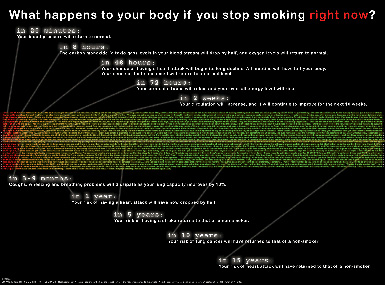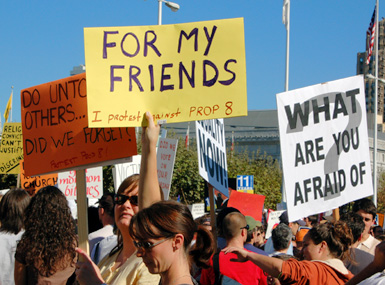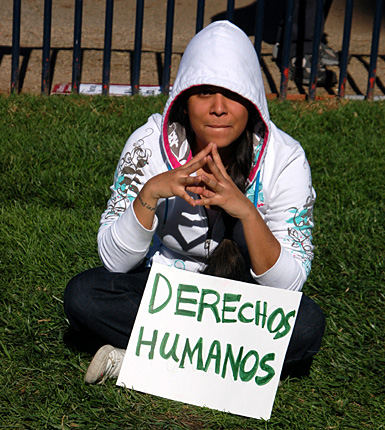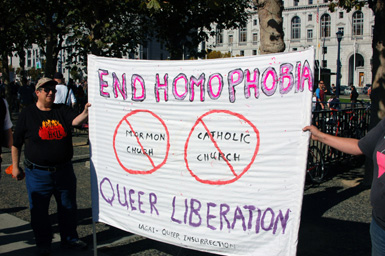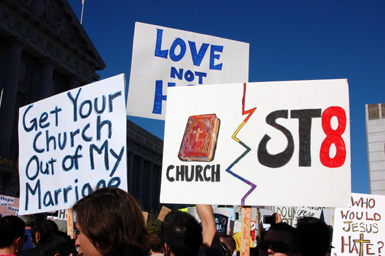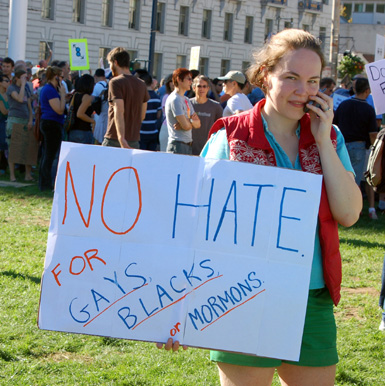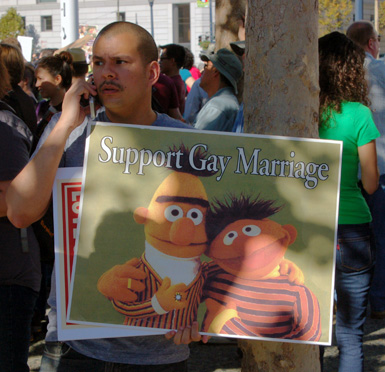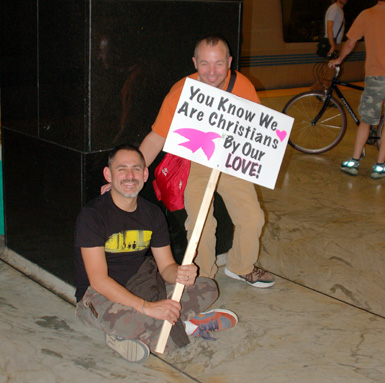
What kind of setback does passage of Prop. 8, banning same-sex marriage in California, imply? In this long post I'm going to hold Prop. 8 up against four historical precedents and see what I can tease out.
Prop. 8's passage might show that same-sex marriage is as deeply contested a social issue as is a woman's right to choose to have an abortion. This is certainly what Prop. 8's proponents, especially the Mormon Church and the Roman Catholic Church, hope to make of gay marriage.
And there are some parallels. Like gay marriage in California, a woman's right to choose to abort a fetus that can't live on its own derives from a court ruling.
Roe v. Wade, decided in 1973, followed years of agitation for removal of legal restrictions on abortion; the emerging women's movement argued that the state had no business forcing women to bear and take responsibility for unwanted children. California liberalized its law in 1967; New York soon followed. The
Roe decision rather suddenly catapulted the whole country, not just the liberalizing coasts, into the era of women making choices about pregnancy. Those who feel deeply that abortion is culpable murder have felt victimized by a society gone inexplicably mad ever since -- and have fought a desperate rearguard action with strategies ranging from murder and clinic bombings to legal chipping away at
Roe. The U.S. mainstream has remained stubbornly unwilling to criminalize abortion, but still queasy about the practice.
Politicians ride this social unease on all sides for various ends. When Roe was decided, Protestant Evangelicals were not central to the anti-abortion forces; the grass roots of the anti-choice folks were Roman Catholics. (
Kristin Luker's mid-80s research cited here.) But it proved politically advantageous to conservatives turning fundamentalists into the shock troops of reaction to pump up the abortion issue. Today, though Catholic bishops fulminate and sometimes deny communion to pro-choice politicians,
they no longer sway the votes of anti-choice Catholics, as Obama's Catholic margins show. The number of abortions among white teenagers are way down from the 1980; but one in three U.S. women will have an abortion in her lifetime,
60 percent after bearing a previous child. As a society, we remain morally conflicted about abortion, but with Obama's election, we are unlikely to see courts that will outlaw it. And the last 30 years have shown majorities won't allow it to be outlawed by legislative action either.
The assertion that gay marriage is a moral evil that would somehow undermine "the family" is opponents' strongest card -- because real, wildly diverse, families in the U.S. are under tremendous stress. In fact, we've just seen an election in which President-elect Obama's margin was in some sense
anchored by people who are actively parents with young children at home -- just those whose family units are under the most stress. The fact that we now have a party running the government that understands its role as making it easier for all families to thrive only bodes well for future acceptance of gay families that want the equal rights and social supports. It's hard to portray people who just want to live what are considered normal, moral lives as evil incarnate.
For all the fond hopes of the proponents of Prop. 8, same-sex marriage simply doesn't raise the moral qualms and passions that abortion does -- on this issue, the question of whether same-sex marriage is a moral problem is strictly a generational question. Younger people can't get their minds around the notion that this is a true evil. There's just no base for growing a fight against same-sex marriage as a passionate crusade, even among otherwise conservative young people.
A majority of young white evangelical Christians support legal recognition of civil unions or marriage for same-sex couples. Fifty-eight percent of young white evangelicals support some form of legal recognition of civil unions or marriage for same-sex couples; a quarter (26 percent) support the full right for same-sex couples to marry. White evangelicals over age 30 are less supportive: forty-six percent favor some legal recognition, but only 9 percent of older white evangelicals favor full marriage rights.
Religion and Ethics Weekly,
September, 2008
Perhaps the passage of Prop. 8 signals a repulsion against gay marriage akin to that which fueled resistance to desegregation of public accommodations? Within the memory of some of us, many white people in this country claimed a right not to have to sit near Black people in restaurants or on buses (the short-hop airlines of that era.) The idea of such proximity was unbearable to them. African American civil rights protesters and a few allies pushed for universal equal access to such public services through the 1950s and 60s at great personal cost in beatings and deaths -- and in 1964 Congress got around to outlawing segregation. Now the kind of social segregation that was the norm in those days is simply unimaginable.
I raise this point because this kind of resistance is what those of us who support gay marriage are positing when we charge our opponents with homophobia. Supporters of Prop. 8 are quick to disavow homophobia -- why they claim to have gay friends and co-workers! If true, not for long as numerous post-election stories corroborate.
People who are gay know when we are running into "the ick factor." Our society is uneasy about sexuality and gender issues. It must be somebody's fault that human sexuality is so unpredictable, irrational, wonderful and dangerous. Blame gay people -- we are in charge of being scapegoats for sexuality's ills at the same time we're sometimes secretly envied for living outside the rules. Normalizing us by letting us marry raises tremendous anxiety among some people. The proponents of Prop. 8 may not personally be revolted by contact with gay people -- but they are tickling a social itch that is common enough and they should be held responsible for what they unleash.
Will irrational homophobia be enough to stop gay marriage? I don't think so. Like the kind of racism that is expressed in avoiding social contact in public settings, this sort of bigotry can be legislated out of existence -- or at least out of social acceptance. And it can be combated with alternative images. No wonder all those gay weddings were so threatening -- my God, the homos are just people, many of them with children, and grandparents, and ordinary homes, and jobs!
Segregation in public accommodations was overturned when agitation by the oppressed group made it no longer worth the while of the authorities to maintain it. This is what the on-the-streets element of an energized gay movement is good for. And we've sure been out there since November 4, in numbers and energy that probably surprised many who managed the No on Prop. 8 campaign.
Is the Prop. 8 setback akin to what happened with Prop. S. in San Francisco in 1989? This one is obscure, but relevant. In May 1989 the San Francisco Board of Supervisors passed by a vote of 9-0 and Mayor Art Agnos signed a domestic partnership ordinance. Gay couples who registered would be granted some pretty pathetic recognition, in particular the right to visit a sick partner who was hospitalized. Remember, this was at the height of the AIDS plague. Local rightwing churches successfully gathered enough signatures to put the ordinance to a referendum, an up or down vote of the city's people. All of a sudden, the gay community had to defend the new law.
My perspective on what ensued is very personal -- I worked as the grass roots organizer for the "Yes on S" (yes on the domestic partnership law) campaign. The community at large had not been agitating for this new status -- LGBT people hardly knew what the law meant. Many gay men feared that domestic partnership would stick them with their dying lover's debts. (It wouldn't have.) Gay folks didn't trust the city; in the midst of the campaign, San Francisco police went wild on demonstrators in the Castro neighborhood, locking up hundreds and beating enough so that brutality lawsuits continued for years. In all my years of campaigning, I have never had such a hard time mobilizing volunteers. We frequently had a 100 percent flake rate. None of the 25 or so people who had promised to work would show up to canvass, week after week.
Just as "Yes on S" began to get a little community traction (traction we needed to mobilize San Francisco's liberals to vote for the novel measure), the Loma Prieta earthquake threw all of us for a loop -- literally, tiles felt in the campaign office as we huddled under desks. The electorate's mood turned sour. On Election Day, we lost narrowly. In the light of Prop. 8, it is interesting to read how the New York Times reported this defeat for a gay rights measure. Church groups called the measure a ''bizarre social experiment'' and an attack on the family that would erode traditional values. Opponents also argued that it paved the way for extending health and pension benefits to unmarried couples, potentially costing taxpayers thousands of dollars.
The Roman Catholic Church distributed 25,000 leaflets challenging the measure.
''The story here is the hidden power of church groups to affect an election like this,'' said Dick Pabich, the measure's campaign manager. The measure was defeated by fewer than 2,000 votes in a surprisingly high turnout.
Sound familiar?
So San Francisco's domestic partnership ordinance was repealed by popular vote -- and the gay community woke up, decided it had been dissed, and decided it wanted domestic partnership very much indeed. The very next year, a determined citywide campaign passed a slightly better domestic partnership law by initiative. Opponents attempted repeal in 1991 -- but there was no going back.
Clearly gay marriage in 2008 had a much wider gay constituency than that first domestic partnership law ever had -- lots of gay people have put years into creating the context that led to last May's California Supreme Court decision that legalized our unions. But during the Prop. 8 campaign, enthusiasm for defending marriage was far from automatic or universal within the gay world. There was still, I think, something of a generational divide that mirrors the generational divide in the vote. Younger gays think our right to marry should be self-evident; many older gays often think marrying is something the other kind of people who hate us do, an oppressive artifact of social arrangements that control women and property. This kind of gay person certainly voted against Prop. 8, but it wasn't their big issue.
However, none of us like getting beat. Especially we don't like getting beat by out-of-state religious forces who lie about us to win. As Emily commented on a previous article on this blog: I feel personally alienated after getting something I didn't really know I wanted, loved once I had it, and now see [it] taken away.
There are a lot of us nationwide having those feelings -- and that reaction will fuel a much more energetic and sophisticated gay advocacy effort than we had in the No on Prop. 8 campaign. I would be willing to bet that this will have been the last time that the forces of religious reaction win an anti-gay vote in a true-blue state. As with San Francisco's first domestic partnership law, even this time, we enjoyed the support of most of the state's political establishment (including both the Governator and DiFi!), the major media outlets, and even significant parts of the faith communities. Barring social collapse brought on by economic collapse, that coalition wins over time.
But will Prop. 8 go the way of Prop. 187? Prop. 187 (1994) was white California voters' vehicle for expressing their fear of ongoing immigration, particularly Mexican immigration. It denied state funded health care and education to undocumented immigrants and their children. It passed by a roughly 60-40 statewide vote.
And it was essentially illegal -- a state attempt to meddle in federal immigration policy, put on the ballot to help a Republican governor increase his turnout. Federal courts slapped most of it down, to the huge distress of the majority that voted for it. Some parts crawled back into federal immigration law, but Prop. 187 died forever when a Democratic governor in 1998 stopped defending it. (Republicans also lost any chance at the Latino vote for a decade... nice to see some comeuppance for this kind of cynical racism.)
The legal challenge to Prop. 8 may prevail. I am not a lawyer, but rather to my surprise it sounds plausible. (I didn't think there was much hope for the challenges to Prop. 187 back then.) If that happens, the fight will turn to whether gay marriage opponents want to threaten the California Supreme Court justices. There is a precedent for that too, unhappily. In 1986, death penalty hard liners successfully persuaded the state's voters to remove Chief Justice Rose Bird and Justices Cruz Reynoso and Joseph Grodin. The judges had killed an inadequate number of people, always a touchy subject in this pro-death penalty state.
If the Court tosses Prop. 8, the energized gay movement must put its weight into defending the justices who vote with us. That's a tough project; a determined minority that can mobilize its voters (the anti-gay religious sector qualifies for that description I think) can make hay on such a down-ballot question. But if it goes that way, we -- LGBT people -- will owe.

















